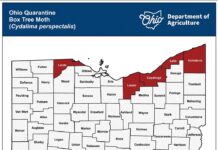SALEM, Ohio – Ag educators in Pennsylvania are worried a new proposal could put the state’s vo-ag programs in danger.
The state department of education, however, says its proposal will simply hold schools more accountable for conducting the required hours of classroom instruction.
The proposed revisions toPennsylvania’s Education Act Chapter 339 requires all schools – conventional and career and technical centers – to provide proof of 360 hours of classroom time per year for every student enrolled in a vocational education program.
The public has until March 6 to offer its opinions.
Hourly requirements. The state has always required 360 hours of education per year for vocational students, but the proposal changes how those hours can be accumulated.
According to Larry Way, president of the Pennsylvania Association of Agricultural Educators, students are currently allowed to meet hourly requirements through the classroom, plus activities like supervised agricultural experiences and employment related to vocational classes. The proposal would mandate 360 hours of just classroom time.
“The way it was written before was a lot less specific,” Way said.
With the typical 180-day school year, some say the 360-hour requirement will make it nearly impossible for students to take vocational classes at conventional high schools.
“A kid can’t get three periods a day in ag and do everything else they need to do,” said Clifford Wallace, an ag teacher at Mohawk High School in Bessemer, Pa.
For schools with 40- to 45-minute periods, students would have to devote three periods a day to their vocational education classes.
“It’s very difficult to achieve that,” Wallace said.
Way agreed, saying there are many demands on a student’s time at school.
Report. Brian McDonald, deputy press secretary for the department of education, said the proposal simply calls for schools to submit a report every five years proving it meets the hourly requirements.
He added the proposal affects all vocational education – not just agriculture.
In the past, schools could submit an initial approval encompassing the 360-hour requirements and have the program in place indefinitely.
“We’re just placing a greater level of emphasis on the number of hours being taught,” McDonald said.
He said the purpose of the proposal is to increase the quality of vocational education in Pennsylvania.
“We’re not out to shut programs down,” he added.
There are 382 high schools and career and technical centers offering ag education in Pennsylvania. According to McDonald, the department will review the curriculum for each program area and if a school fails to meet the standards, it will have three years to update its material.
Schools that continually fail to meet the standards could lose their funding for vocational programs.
According to Way, hourly requirements were not a criteria for funding in the past.
Wallace is also concerned about the proposal’s affect on FFA programs.
“If you’re not a vocational department, I’m not entirely sure where your FFA program stands,” he said.
Schools must have an agriculture program approved by the state in order to form an FFA chapter, Wallace added.
Way said the proposal penalizes students in rural areas because many rural areas don’t have career and technical centers, leaving students dependent on their conventional high schools for vocational education.
Anchor Assessments. In addition to Chapter 339, the Pennsylvania Association of Agricultural Educators is also concerned with the state’s Anchor Assessments for science. Anchor Assessments reflect the standards upon which students will be tested at various grade intervals for several content areas.
In a letter to Gerald Zahorchak, Pennsylvania acting secretary of education, Way noted the 2007 science Anchor Assessment for students in grade 11 includes criteria for environmental and ecology education, but does not include criteria for agriculture.
“The science anchors have virtually wiped out any mention of our connection to agriculture,” he wrote.
Public comment
* The deadline for public comment on the Chapter 339 proposal is March 6.
* Comments, suggestions or objections regarding the proposal can be submitted to Robert Barlett, Director, Bureau of Career and Technical Education, 333 Market St., Harrisburg, PA 17126-0333.
(Reporter Janelle Skrinjar welcomes feedback by phone at 800-837-3419, ext. 22, or by e-mail at jskrinjar@farmanddairy.com.)










